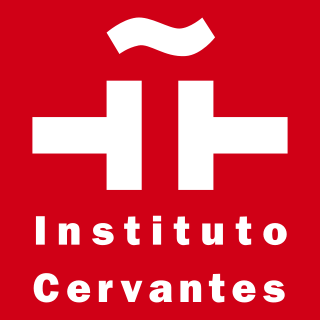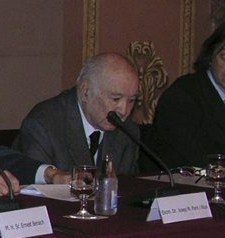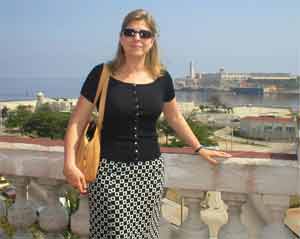
Instituto Cervantes is a worldwide non-profit organization created by the Spanish government in 1991. It is named after Miguel de Cervantes (1547–1616), the author of Don Quixote and perhaps the most important figure in the history of Spanish literature. The Cervantes Institute, a government agency, is the largest organization in the world responsible for promoting the study and the teaching of Spanish language and culture.

Ramón José Sender Garcés was a Spanish novelist, essayist and journalist. Several of his works were translated into English by the distinguished zoologist, Sir Peter Chalmers Mitchell, including Seven Red Sundays , Mr Witt Among the Rebels and The War in Spain (Contraataque).

The Spanish National Research Council is the largest public institution dedicated to research in Spain and the third largest in Europe. Its main objective is to develop and promote research that will help bring about scientific and technological progress, and it is prepared to collaborate with Spanish and foreign entities in order to achieve this aim.
Fondo de Cultura Económica is a Spanish language, non-profit publishing group, partly funded by the Mexican government. It is based in Mexico but it has subsidiaries throughout the Spanish-speaking world.
The Diplomas de Español como Lengua Extranjera, or DELE, are official diplomas issued by the Spanish Instituto Cervantes on behalf of the Spanish Ministry of Education and Science to participants who have passed a standardised test indicating their European Spanish language proficiency. The diplomas do not expire. Every year, more than 60,000 examinations are taken by candidates in more than 800 examination centres from more than 100 countries. In many countries, the DELE Diplomas have been adopted by schools and universities as a complement to their own evaluation systems, such that it is used as an entry requirement for non-native Spanish speakers.

Martí de Riquer i Morera, 8th Count of Casa Dávalos was a Spanish–Catalan literary historian and Romance philologist, a recognised international authority in the field. His writing career lasted from 1934 to 2004. He was also a nobleman and Grandee of Spain.

Ida Vitale is a Uruguayan poet, translator, essayist, lecturer and literary critic.

Olvido García Valdés is a Spanish poet, essayist, translator, and professor. She is married to the poet Miguel Casado.
Sergio Esteban Vélez Peláez is a Colombian writer, professor and journalist. He won the Premio Nacional de Periodismo Simón Bolívar 2010 », the Premio Internacional de Periodismo José María Heredia 2010 .) and the Premio Cipa a la Excelencia Periodística 2012. The poet Olga Elena Mattei says that Vélez represents the Andean aspect of the contemporary Colombian poetry. Vélez is a Communicator of the University of Antioquia, Colombia.
Carmelo Elorduy, S.J. was a Spanish Sinologist. Elorduy was born in Mungia and his first trip to China was in 1926, where he worked at the Jesuit mission located in Wuhu City, Anhui. He returned to Spain in 1932 to finish his degree in Theology and Philosophy and to become a priest with the Society of Jesus. He returned to China in 1934 and remained there until 1951 when he moved to Macao and the following year to Taichung. For health reasons he moved back to Spain in 1959 and while resting in Oña and encouraged by his brother Eleuterio, he began translating some of the Chinese Classics. Most of his translations of the Chinese Classics became the first to be done directly from Classical Chinese into the Spanish language.
Justo Bolekia Boleká is an Equatorial Guinean scholar and writer of Bubi descent.

José Hierro del Real, sometimes colloquially called Pepe Hierro, was a Spanish poet. He belonged to the so-called postwar generation, within the rootless and existential poetry streams. He wrote for both Espadaña and Garcilaso magazines. In 1981, he received the Prince of Asturias Awards in Literature, in 1998 the Cervantes Prize and he received many more awards and honours.

The vice president of El Salvador is a political position in El Salvador which is elected concurrently with the position of President of El Salvador.
Eduardo Haro Tecglen (1924–2005) was a Spanish journalist, writer and theatre critic.

Manuel Paso (1864–1901) was a Spanish poet and playwright.

Diego Martínez Torrón is a professor of Spanish Literature at the University of Córdoba, Spain, and a writer, author of essays, poetry and novels. He has been a speaker at many of the major universities in Europe and the United States. A specialist in nineteenth and twentieth century Spanish literature he has published numerous books on Spanish Romanticism, with interpretive contributions and unpublished texts. He has edited the most faithful edition of the complete works of authors such as José de Espronceda and the Duque de Rivas. He has also written about Lista and Quintana and the work of Spanish progressive liberals from the early nineteenth century to the end of the period of Romanticism. He has studied the poetic thought of Juan Ramón, Octavio Paz and José Bergamin. He has also dedicated numerous studies to the works of Cervantes. He has studied the narrative of Álvaro Cunqueiro, Juan Benet, Azorín and has published the first annotated edition of El Ruedo Ibérico of Valle-Inclán. His concept of literary methodology stems from a new, non-Marxist approach to the binomial ideology and literature. He has edited Don Quixote, studying the thinking of Cervantes.
Noël Ritter Valis is a writer, scholar and translator. She is a Professor of Spanish at Yale University.

Beatriz Hernanz is Spanish poet and critic. She was born in Pontevedra (Spain) in 1963.

The Instituto de Enseñanza Secundaria San Isidro is a co-educational day school for pupils from 12 to 18 years of age. It is located in the historical Calle de Toledo in Madrid, Spain.
Sultana Wahnón Bensusan is a Spanish essayist and literary critic, a professor at the University of Granada specializing in literary theory and comparative literature.












